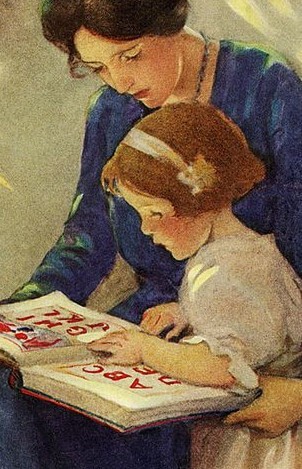Blast from the Past: First posted November 21, 2007; re-posted July 26, 2018. Advice on reading books with kids. I means this advice mainly for parents, but it is relevant to teachers in terms of how and what they should read to kids. Since Common Core such advice has become more common, but this was first issued years before CCSS.
I'm frequently asked about reading to children. Obviously reading to kids is a good idea, though this is one of those satisfying times when the research literature actually supports the good idea. Research clearly shows that reading to children improves their oral language development (at this stage the evidence that it contributes directly to the improvement of reading skills is pretty sparse).
Turn on the news and there is a PSA encouraging parents to read to their kids. You take your child in for a check up and the pediatrician gifts you with a book and encourages you to read (check out Reach Out and Read to find out more about this wonderful idea). Your child has trouble at school, and you guessed it, the teacher tells you to read to him if you want to help.
Maybe we oversell the idea of reading to kids, but I tend to think we mis-sell it.
- We too rarely make it clear that book reading is only part of this equation. Reading to kids pays off, but it pays off best when there is a lot of talk between parent and child about the book, about its vocabulary and its connection to the child's life. Children sometime lead this talk with their questions and comments and sometimes the parents do with their questions and explanations.
- We act like reading anything to kids will have a positive impact... doubtful. Some books will entice kids and engage their minds and hearts... and some will bore them or interest them momentarily without leaving any residue behind. When my kids were young I read to them all the time, but I didn't usually read the hot picture books that are so ubiquitous at book sharing time. I read classics--demanding, grown up, lots of pages... Books like Alice in Wonderland, A Tree Grows in Brooklyn, Catcher in the Rye, Black Boy, The Odyssey, The Hobbit, Charlotte's Web, The Adventures of Huckleberry Finn, Gulliver's Travels, The Wind in the Willows. Don't be afraid to challenge your kids with something that will stick to their ribs. If you pick wrong, you can always bail out and pick something better suited to your child's needs.
- We encourage reading to kids when sometimes we want the kids reading to us. Studies show that when children start to read (kindergarten, first grade, second grade) it is very powerful to have them reading aloud to you. I'm always surprised that at those levels the teachers are pushing reading to kids when the parents could be even more helpful by listening.
- We rarely talk about what age kids should be read to. I started with mine the day they were born. You don't need to start that early, but it won't hurt (and mine seemed to take to it). Too many parents don't read to the kids until they get to school, losing a lot of opportunity. However, I also know plenty of parents who stop reading to kids when they start to learn to read themselves. Big mistake. I read to my kids from birth all the way up to 8th grade.
- We push the idea that reading to kids improves their language (and maybe their reading too), but there is a lot more to it in my opinion. I see it as a great way of expressing love. My kids and I were able to connect around books; the books I read to them made a difference in their lives--in what they have chosen to do for their work lives, in what they care about, in what they know about. I suspect that when they read a really wonderful passage of something, they even think of me (a nice return on a small, and easily made, investment).
- We act like reading to kids is about reading stories. Of course, sometimes that is exactly what it is about. But each kid is unique and they like lots of different things. For one child, there would be nothing better than a good storybook, and for another a book about computers or science or baseball would more likely fill the bill. My youngest complained that I always picked the books. I told her she could make the next choice. She didn't really believe me, but looked hard at the bookcase, and asked if I would read In the Shadow Man, a book about the study of chimpanzees by Jane Goodall. Not exactly the kind of book one thinks of reading to a six-year old, but she fell in love with Jane Goodall (and is still a big fan), and found her own interest in science that day--now she is a bioengineer.







Comments
See what others have to say about this topic.